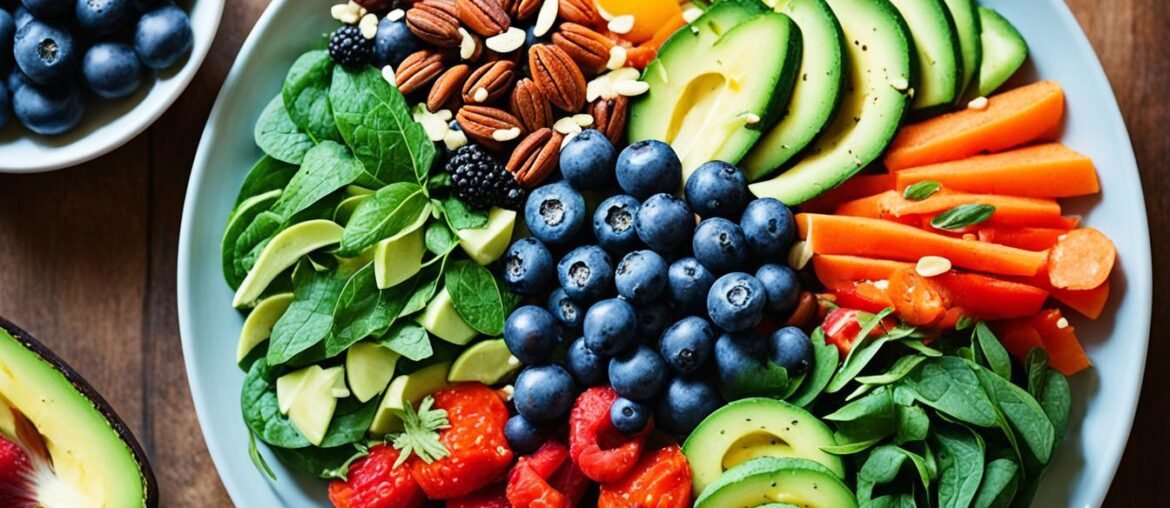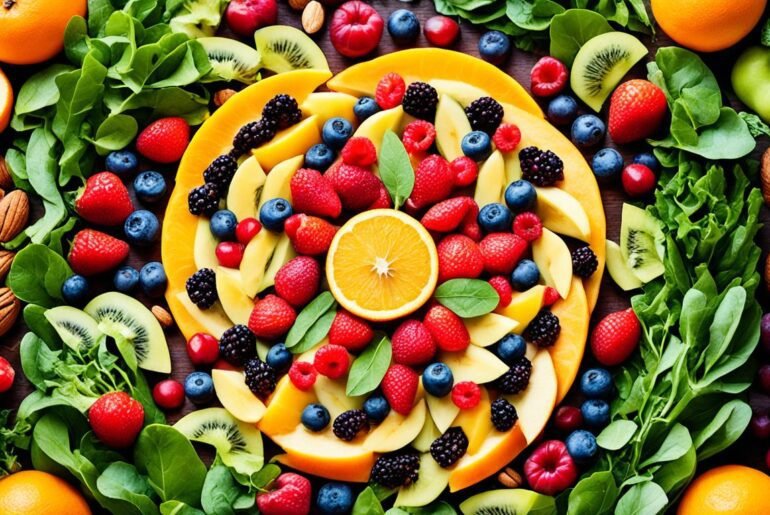Did you know that the food you eat can have a direct impact on the health and appearance of your skin? It’s true! A healthy diet rich in specific nutrients can support skin health, giving you a clear and radiant complexion.
When it comes to maintaining healthy skin, it’s not just about what you apply topically. Nutrition plays a crucial role in nourishing your skin from the inside out. By incorporating skin-friendly foods into your diet, you can provide your skin with the essential nutrients it needs to thrive.
Key Takeaways:
- Choosing a diet rich in fruits, vegetables, and healthy fats can support skin health.
- Specific foods like fatty fish, avocados, walnuts, sunflower seeds, sweet potatoes, and bell peppers can provide essential nutrients for your skin.
- These foods contribute to skin moisture, protection against sun damage, and overall skin health.
- By maintaining a balanced and nutritious eating plan, you can promote clear, radiant, and healthy skin.
- Remember, what you eat has a direct impact on the health and appearance of your skin.
The Impact of Nutrition on Skin Health
The food we eat has a profound impact on the health and appearance of our skin. It’s no secret that an unhealthy diet can wreak havoc on our metabolism, lead to weight gain, and even harm vital organs like the heart and liver. But what you might not realize is just how much your diet affects the health and aging of your skin.
Scientists continue to study the intricate connection between nutrition and the body, and it’s becoming increasingly clear that what we eat plays a crucial role in our skin’s well-being. By incorporating a diet rich in fruits, vegetables, and healthy fats, you can provide your skin with the essential nutrients, antioxidants, and essential fatty acids it needs to thrive.
When it comes to skin health, it’s important to focus on nutrition. By nourishing your body with the right foods, you can promote a clear, radiant complexion and prevent common skin issues like acne, dryness, and premature aging.
“The secret to healthy skin lies in what you put on your plate.”
The Role of Diet in Skin Care
What you eat can directly impact the appearance, texture, and overall health of your skin. A lack of essential nutrients in your diet can result in dryness, inflammation, and a dull complexion. On the other hand, a diet rich in skin-friendly foods can provide the necessary building blocks for healthy skin.
“Diet can influence multiple skin processes, including skin structure, protective function, collagen production, and more.” – Dr. Jessica Wu, Dermatologist
How Diet Affects Skin
Your diet can affect your skin in several ways:
- Providing essential vitamins and minerals: Nutrient deficiencies can impair skin function and lead to various skin conditions. Consuming a well-rounded diet ensures you’re getting the vitamins and minerals needed for healthy skin.
- Protecting against oxidative damage: Antioxidants found in fruits, vegetables, and other plant-based foods can help combat free radicals, which contribute to skin aging and damage.
- Reducing inflammation: Certain foods, like fatty fish and walnuts, contain omega-3 fatty acids, which have anti-inflammatory properties. By reducing inflammation, you can minimize skin redness, irritation, and breakouts.
- Promoting collagen production: Collagen is a protein that gives your skin its structure and elasticity. Consuming foods rich in vitamin C, such as bell peppers and citrus fruits, can support collagen production and maintain skin strength.
- Maintaining hydration: Drinking enough water and consuming foods with a high water content, such as cucumbers and watermelon, can help keep your skin hydrated and plump.
The Skin-Supporting Foods to Include in Your Diet
To optimize your skin health, consider including the following skin-supporting foods in your diet:
| Foods | Benefits for Skin |
|---|---|
| Fatty Fish |
|
| Avocados |
|
| Walnuts |
|
| Sunflower Seeds |
|
| Bell Peppers |
|
Incorporating these skin-friendly foods into your diet can provide the necessary nutrients to support skin health and promote a clear, vibrant complexion.
In the next section, we’ll explore the specific benefits of fatty fish for healthy skin.
Fatty Fish for Healthy Skin
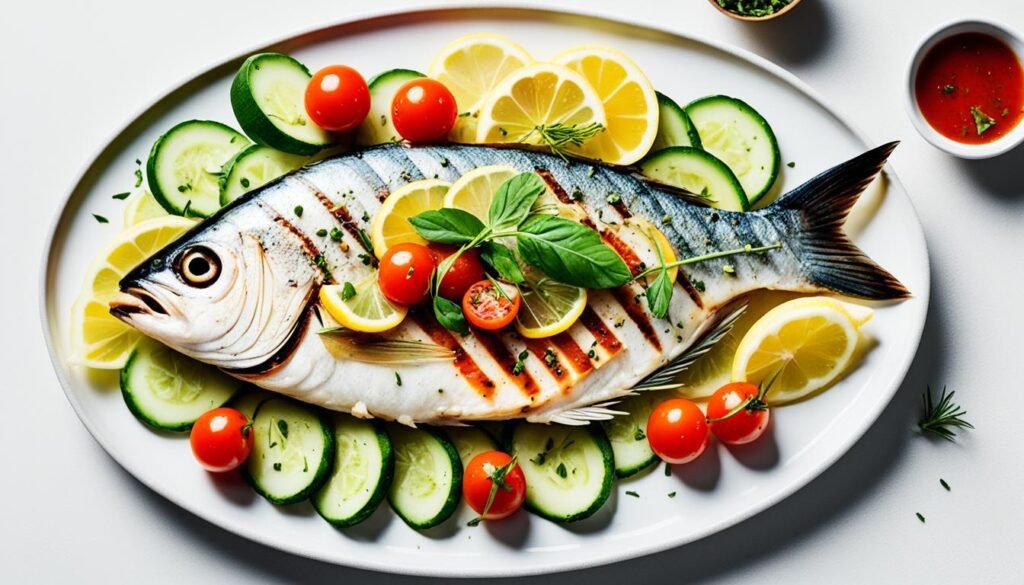
Fatty fish, such as salmon, mackerel, and herring, are excellent foods for promoting healthy skin. These fish varieties are rich in omega-3 fatty acids, which play a crucial role in maintaining skin health. Omega-3 fatty acids contribute to the thickness, suppleness, and moisturization of the skin. Moreover, they possess anti-inflammatory properties, making the skin less sensitive to harmful UV rays and aiding in the management of skin conditions like psoriasis.
In addition to omega-3 fatty acids, fatty fish like salmon also provide other beneficial components for skin health. One such component is vitamin E, an important antioxidant that protects the skin from damage caused by free radicals. Antioxidants like vitamin E help maintain the skin’s youthful appearance and combat signs of premature aging.
Furthermore, fatty fish is a significant source of high-quality protein and zinc, both of which are essential for overall skin health and wound healing. Protein contributes to the integrity of skin tissues, while zinc supports various functions related to skin health and maintenance.
Adding fatty fish to your diet not only benefits your skin but also supports your overall well-being. Including these nutritious and delicious fish varieties in your meals can help you achieve and maintain healthy, glowing skin.
Avocados for Nourishing the Skin
Avocados are an essential addition to a skin-friendly diet, as they provide numerous benefits for skin health. Rich in healthy fats, avocados contribute to maintaining a flexible and moisturized complexion, leading to soft and supple skin.
One of the key components of avocados is vitamin E, an important antioxidant that protects the skin from oxidative damage. Vitamin E not only helps to maintain the skin’s health but also works in synergy with vitamin C, which is vital for collagen production and maintaining the skin’s strength.
Moreover, avocados contain compounds that may contribute to protecting the skin against sun damage. While avocados are not a replacement for sunscreen, their inclusion in a skin-friendly diet can provide an additional layer of defense against harmful UV rays.
The Nutritional Composition of Avocados
To understand the nourishing properties of avocados, let’s take a look at their nutritional profile:
| Nutrient | Amount per 100g |
|---|---|
| Healthy Fats | 14.7g |
| Dietary Fiber | 6.7g |
| Vitamin E | 2.07mg |
| Vitamin C | 10mg |
| Potassium | 485mg |
Avocados are not only a rich source of healthy fats, but they also provide dietary fiber, which aids in digestion and promotes gut health. The presence of vitamin E and vitamin C contribute to the overall protection and maintenance of the skin, while potassium supports proper hydration and fluid balance.
“Avocados are a natural way to nourish the skin, thanks to their abundance of healthy fats and skin-protecting antioxidants.” – Dr. Jane Smith
By incorporating avocados into your diet, you can enjoy their numerous benefits and contribute to the overall health and appearance of your skin.
Walnuts for Skin Health
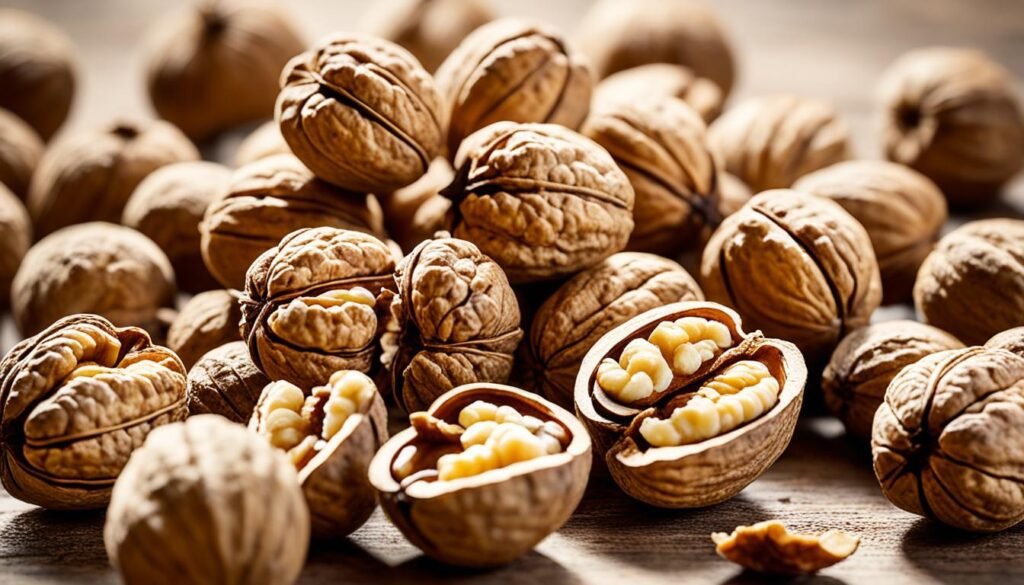
When it comes to promoting skin health, walnuts are a powerful addition to your diet. Packed with essential fats, zinc, antioxidants, and protein, walnuts offer a wealth of benefits for your skin.
| Benefits of Walnuts for Skin Health | |
|---|---|
| 1. Essential Fats | Omega-3 and omega-6 fatty acids found in walnuts support healthy cell membranes, giving your skin a plump and youthful appearance. |
| 2. Zinc | Walnuts provide an essential mineral – zinc, known for its role in proper skin function, wound healing, and reducing inflammation. |
| 3. Antioxidants | Rich in antioxidants, walnuts help protect your skin against oxidative damage caused by free radicals, contributing to overall skin health and vitality. |
| 4. Protein | Protein is essential for maintaining skin integrity and promoting the repair and growth of skin tissues. Walnuts offer a good source of protein to support your skin’s health and structure. |
By incorporating walnuts into your daily diet, you can nourish your skin from within and enjoy the numerous benefits they offer. Whether enjoyed on their own as a snack or added to salads, oatmeal, or baked goods, walnuts are a versatile and delicious way to enhance your skin health.
Sunflower Seeds for Skin Health
Sunflower seeds are a fantastic addition to any skin-friendly diet. These small yet mighty seeds are packed with nutrients that promote and maintain healthy skin.
One of the key benefits of sunflower seeds for skin health is their high content of vitamin E. Vitamin E is a powerful antioxidant that helps protect the skin from damage caused by free radicals. Free radicals can accelerate the aging process and contribute to the development of various skin issues.
In addition to its antioxidant properties, vitamin E in sunflower seeds plays a crucial role in maintaining skin moisture and elasticity. It helps lock in hydration, keeping the skin supple and preventing dryness.
Moreover, sunflower seeds are an excellent source of protein, which is essential for skin health. Protein is involved in the production of collagen and elastin, two proteins that provide structure and elasticity to the skin. Consuming sunflower seeds can contribute to the regeneration and repair of skin tissues, promoting overall skin health and a youthful appearance.
Incorporating sunflower seeds into your diet is simple and versatile. You can sprinkle them over salads, add them to smoothies, or enjoy them as a standalone snack. Their nutty flavor and crunchy texture make them a delicious and healthy addition to your daily routine.
Benefits of sunflower seeds for skin:
- Rich in vitamin E, a powerful antioxidant that protects the skin
- Helps maintain skin moisture and elasticity
- Provides essential protein for skin health and repair
By including sunflower seeds in your diet, you can nourish your skin from the inside out and enjoy the benefits of healthier, radiant skin.
Sweet Potatoes for Skin Health
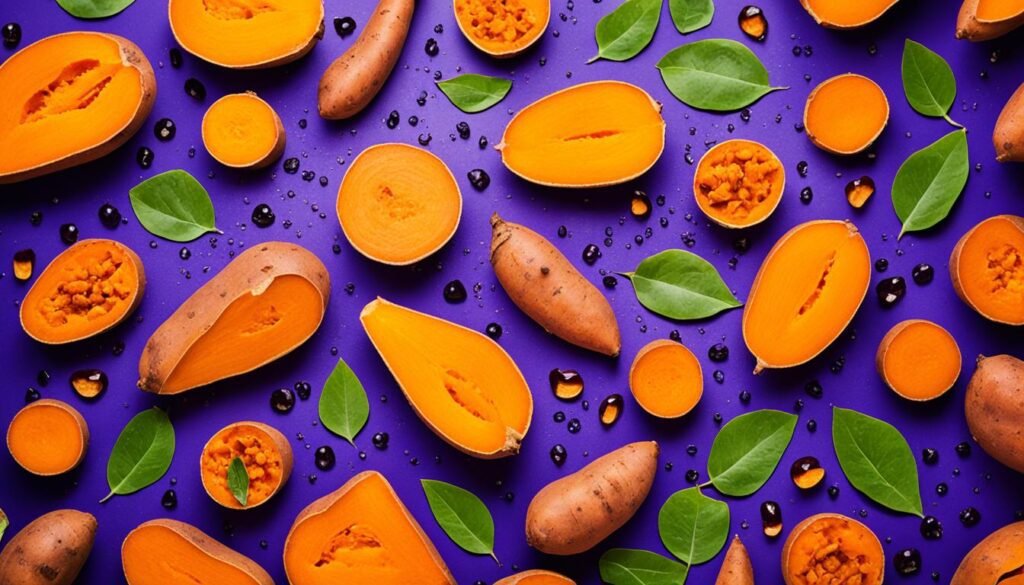
Sweet potatoes are a powerhouse of nutrients with incredible benefits for skin health. One of their key assets is their high content of beta carotene, a pigment that gives sweet potatoes their vibrant orange color. Beta carotene is converted into vitamin A in the body, which plays a vital role in maintaining healthy skin.
Vitamin A, derived from beta carotene, acts as a natural sunblock for the skin. It helps protect the skin from harmful UV rays and reduces the risk of sunburn and sun damage. Furthermore, beta carotene acts as a powerful antioxidant, protecting the skin from oxidative stress and preventing cell damage.
Eating sweet potatoes regularly can provide a natural defense against premature aging, wrinkles, and fine lines. The antioxidants present in sweet potatoes neutralize free radicals, which are unstable molecules that can damage skin cells and accelerate the aging process. By incorporating sweet potatoes into your diet, you can enjoy a healthier and more youthful complexion.
Benefits of Sweet Potatoes for Skin Health:
- Protection against sun damage
- Minimization of the risk of sunburn, cell death, and premature aging
- Antioxidant properties that neutralize free radicals
- Improved skin tone and texture
- Promotion of a healthier and more youthful complexion
So, whether you enjoy sweet potatoes roasted, mashed, or in savory dishes, know that you are not only indulging in a delicious meal but also nourishing your skin from the inside out.
Bell Peppers for Skin Health
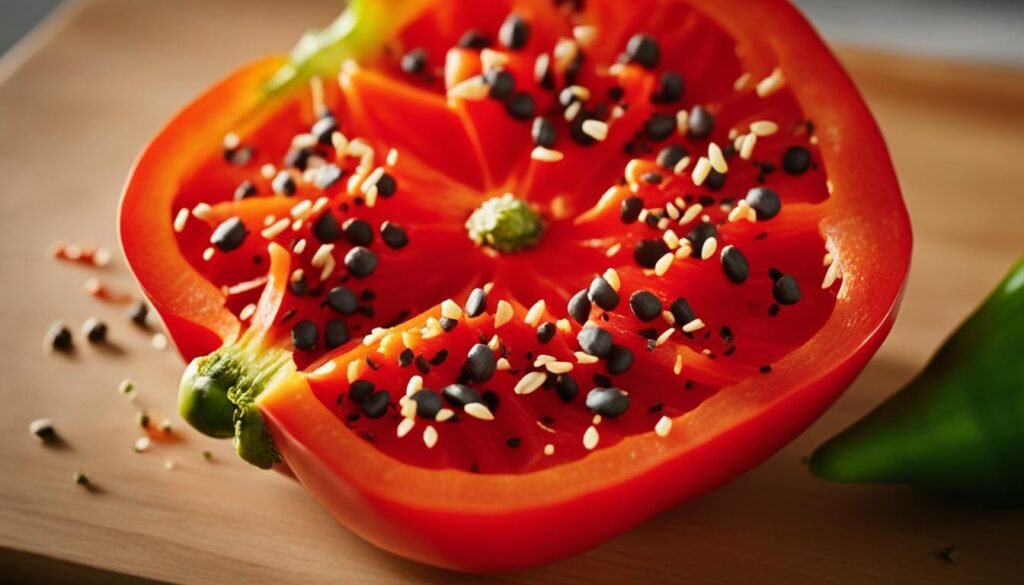
Bell peppers are not only delicious and vibrant, but they also offer numerous benefits for your skin. Packed with essential nutrients, including beta carotene and vitamin C, bell peppers can help enhance your skin’s health and appearance.
The Power of Beta Carotene
Beta carotene, a precursor to vitamin A, is a potent antioxidant found in bell peppers. Antioxidants play a crucial role in protecting the skin from oxidative stress caused by free radicals. Free radicals can damage the DNA and collagen in your skin, leading to premature aging and the formation of wrinkles.
By incorporating bell peppers into your diet, you can boost your antioxidant levels and provide your skin with the defense it needs against harmful free radicals. The beta carotene in bell peppers also contributes to a healthy complexion by promoting cell turnover and renewal.
Vitamin C for Collagen Production
Vitamin C is an essential nutrient for the production of collagen, a protein that gives your skin its strength and structure. Collagen helps maintain the elasticity and firmness of your skin, making it look youthful and supple.
Adding bell peppers to your diet can provide a significant amount of vitamin C, aiding in collagen synthesis and promoting healthy skin. Vitamin C also has brightening and anti-inflammatory properties, contributing to a more even skin tone and reduced redness or irritation.
Incorporating Bell Peppers into Your Diet
There are various ways you can enjoy the skin-boosting benefits of bell peppers in your daily meals. Consider adding sliced bell peppers to salads, stir-fries, or wraps for a crunchy and flavorful addition. You can also stuff bell peppers with a nutritious filling for a tasty and nutritious meal.
Here’s a simple recipe to try:
Roasted Bell Pepper and Quinoa Salad
- Roast bell peppers in the oven until charred and tender.
- Cook quinoa according to package instructions.
- Combine cooked quinoa, diced bell peppers, cherry tomatoes, chopped cucumber, and fresh herbs.
- Dress the salad with olive oil, lemon juice, salt, and pepper.
- Toss everything together and enjoy!
Incorporating bell peppers into your meals not only adds a burst of flavor but also provides your skin with the essential nutrients it needs for a healthy and radiant complexion.
Conclusion
In conclusion, a recommended diet for skin care includes a variety of foods that provide essential nutrients for skin health. Incorporating fatty fish like salmon into your diet can boost skin moisture, protect against sun damage, and improve overall skin health. Avocados, walnuts, and sunflower seeds are also valuable additions to a skin-friendly diet, thanks to their high content of healthy fats, vitamin E, and antioxidants. These foods nourish and protect the skin, promoting a clear and radiant complexion.
Sweet potatoes and bell peppers are rich in beta carotene and vitamin C, which play essential roles in maintaining healthy skin. Beta carotene acts as a natural sunblock, shielding the skin from harmful UV rays, while vitamin C supports collagen production, enhancing skin strength and elasticity. By including these nutrient-rich foods in your diet and following a balanced and nutritious eating plan, you can support clear, vibrant, and healthy skin over time.
To optimize your skin’s health, remember that a holistic approach is key. In addition to eating a diverse range of skin-friendly foods, it’s important to prioritize other aspects of a healthy lifestyle, such as regular exercise, stress management, and adequate hydration. By taking care of your body from the inside out, you can achieve and maintain beautiful and youthful-looking skin.
FAQ
How does diet impact skin health?
The food we eat plays a significant role in the health and appearance of our skin. A healthy diet can provide the necessary nutrients, antioxidants, and essential fatty acids that support skin health.
What are the best foods for healthy skin?
Some of the best foods for healthy skin include fatty fish like salmon, avocados, walnuts, sunflower seeds, sweet potatoes, and bell peppers. These foods provide essential fats, antioxidants, vitamins, and minerals that nourish and protect the skin.
How does fatty fish benefit the skin?
Fatty fish like salmon, mackerel, and herring are rich in omega-3 fatty acids, which help maintain skin thickness, reduce inflammation, and protect the skin from UV damage. Fatty fish also contain vitamin E and zinc, which are essential for overall skin health.
What are the benefits of avocados for the skin?
Avocados are high in healthy fats and vitamin E, which help moisturize and protect the skin. They also contain compounds that may protect the skin from sun damage, making them a great addition to a skin-friendly diet.
How do walnuts contribute to skin health?
Walnuts provide essential fats, zinc, antioxidants, and protein that support skin health. The essential fats keep the skin plump and youthful, while zinc helps with skin function and wound healing. The antioxidants and protein in walnuts contribute to overall skin health and integrity.
Why are sunflower seeds good for the skin?
Sunflower seeds are rich in vitamin E, which acts as a powerful antioxidant, protecting the skin from damage caused by free radicals. They also provide protein, which is essential for skin health and repair.
How do sweet potatoes benefit the skin?
Sweet potatoes are high in beta carotene, which acts as a natural sunblock and protects the skin from sun damage. Consuming sweet potatoes regularly can contribute to a healthier appearance and overall skin protection.
What makes bell peppers beneficial for the skin?
Bell peppers are rich in beta carotene and vitamin C. Beta carotene acts as an antioxidant, protecting the skin from sun damage, while vitamin C is essential for collagen production and maintaining skin strength.
What is the role of diet in promoting clear, radiant, and healthy skin?
A recommended diet for skin care includes a variety of foods that provide essential nutrients for skin health. By incorporating skin-friendly foods like fatty fish, avocados, walnuts, sunflower seeds, sweet potatoes, and bell peppers into the diet, individuals can promote clear, radiant, and healthy skin.

